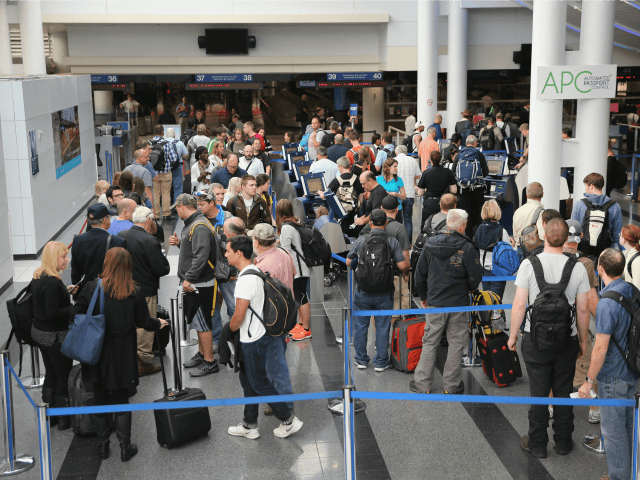In the five days since U.S. District Judge Derrick Watson ruled the Trump administration must include grandparents and other distant relatives as “bona fide relationships” when determining eligibility for visa applications and participation in the federal refugee resettlement program, new refugee arrivals have trickled to a virtual stop.
Since Watson handed down his decision on Thursday, July 13, a mere 25 refugees have been resettled in the United States as of 8:00 am Eastern time Wednesday morning, according to the Department of State’s interactive website. This brings the number of refugees resettled in the United States in FY 2017 to 50,219, slightly more than the 50,000 ceiling President Trump announced in Executive Order 13780, the presidential order whose details have been at the center of contentious and ongoing litigation.
On Friday, Secretary of State Rex Tillerson reportedly sent a cable to all State Department employees instructing them to abide by Judge Watson’s broader definition of “bona fide relationship” when determining the visa eligibility of a resident of one of the six Middle Eastern countries for whom the temporary travel ban identified in Executive Order 13780 applied.
“Grandparents of U.S. citizens from six Muslim-majority countries are now eligible to receive U.S. visas, according to a State Department memo seen by Reuters that reflects the latest court ruling on U.S. President Donald Trump’s travel ban,” Reuters reported.
“The memo, or cable, from U.S. Secretary of State Rex Tillerson was sent to all U.S. diplomatic posts overseas on Friday after a U.S. district judge in Hawaii issued a ruling late on Thursday limiting the scope of the administration’s temporary ban on refugees and travelers from the six countries,” Reuters added.
It is unclear if a similar cable was sent out regarding the arrival of new refugees.
Judge Watson ruled on July 13 in favor of plaintiffs, the state of Hawaii, and Dr. Ismail Elshikh, who argued the Supreme Court’s unanimous June 26 decision that partially overturned Watson’s March 29 preliminary injunction in Hawaii v. Trump halting Section 2 (c) (the temporary travel ban) and Section 6 (the temporary refugee ban) of Executive Order 13780, signed by President Trump on March 6, defined a “bona fide relationship” exception that includes grandparents and other distant relatives.
The Trump administration defined “bona fide relationship” more narrowly, limiting it to parents, siblings, spouses, and fiances.
Late Friday, the Department of Justice (DOJ) went directly to the Supreme Court, “asking for clarification of its June 26 travel ban decision and an immediate stay of U.S. District Judge Derrick Watson’s July 13 ruling that modified his original injunction that stopped Executive Order 13780, which placed a temporary ban on all refugees and a temporary travel ban on residents of six Middle Eastern countries,” as Breitbart News reported:
That original injunction was largely overturned in the Court’s June 26 decision. Watson’s July 13 ruling significantly scaled back President Trump’s Supreme Court victory.
Late Friday, Acting Solicitor General Jeff Wall filed a motion at the Supreme Court asking for the justices to clarify who qualifies as a close family member. If the Court is unwilling to go there, Wall alternatively asked the Court at minimum to stay Watson’s ruling while the U.S. Department of Justice (DOJ) appeals his latest decision.
On Tuesday, as required by the Supreme Court, Hawaii responded to the DOJ motion.
“The Government asks this Court for emergency relief that is procedurally improper and substantively unnecessary,” Hawaii said in its brief filed at noon on Tuesday with the Supreme Court:
It seeks to leapfrog its own pending motion and appeal in the Ninth Circuit and obtain an expansion of the stay this Court issued just three weeks ago. And it contends this extraordinary relief is appropriate because the District Court’s recent modification order has “eviscerated” this Court’s stay.
That is nonsense. The District Court faithfully applied this Court’s opinion, holding that “close relatives” like grandparents and nieces are permitted to enter, and recognizing that the charities, non-profits, and churches that have made a formal, contractual commitment to shelter and clothe refugees would suffer “concrete hardship” if those refugees are excluded.
“Less than twelve hours after Hawaii filed its brief, the Trump administration pushed back with strong words of its own, telling the justices that Hawaii and the other challengers ‘seek to drain’ the Supreme Court’s June 26 order ‘of meaning,'” SCOTUS Blog reported:
The federal government emphasized that, under the challengers’ interpretation, the limits imposed on refugee admissions by the March 6 executive order would essentially be rendered ineffective, because they could not be implemented “as to virtually all refugee applicants who would have” otherwise entered the United States.
And the government characterized the challengers’ position as to which family members should be allowed to enter the United States under the June 26 order as “a caricature of the standard this Court established”: The June 26 order indicated the kinds of “close” relatives who are eligible to apply for visas should have relationships similar to those of the individual challengers in these cases, such as a spouse or mother-in-law, but the challengers would go much further and allow all but “distant” relatives to enter the country.
Though it is not in session, the Supreme Court is expected to rule on the DOJ’s motion sometime this week.

COMMENTS
Please let us know if you're having issues with commenting.